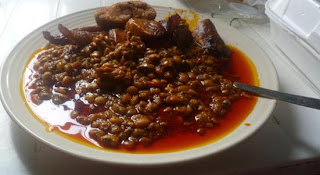“Ghanaian Hospitality” is a phrase that I have thrown around a fair bit since I started writing these blogs. Our homestay mother Bernice shows us what it means to be hospitable every day, as does just about everyone else we meet. But this weekend in particular, as I wandered around Accra by myself as a big-eyed, directionally-challenged foreigner, the outcomes of my travels were invariably positive only because of the many, many strangers that took time out of their day to help me. The end result of the weekend: I made it back in one piece to greet Sarah and Caroline with Ghanaian hair braids, a smile on my face, and a giant pizza when they arrived in Accra =) (see below).

2. Mercy, Juli’s grownup daughter. As Juli was braiding, Mercy left what she was doing to come down and neaten my hair braids for me so that we would finish faster, cutting the stray hair extensions so that my braids looked nice and smooth. I know that she did a great job, because some of the Ghanaians at work commented on how smooth they were.
3. An acquaintance of Juli’s in the market. He let her use his phone for free so she could call around to find out who would have the hair extensions we were seeking.
4. The “mate” (individual who works on the tro-tro collecting fairs and yelling out the destinations) at 37. He left his tro-tro to walk with me to where I could catch a tro-tro to Kaneshi market, just outside of 37 station.
5. The mate that “dashed” me – to “dash” is to pay someone else’s fare for the tro-tro (or in this case, waive the fare) as a chivalrous, romatic gesture.
6. The lady that was going back to my home village in the same tro-tro I was. When the tro-tro mate randomly decided he didn’t actually want to go that far anymore, she bartered for both of our fares back, then took me by the arm and moved us to another tro-tro that was going in the right direction.





